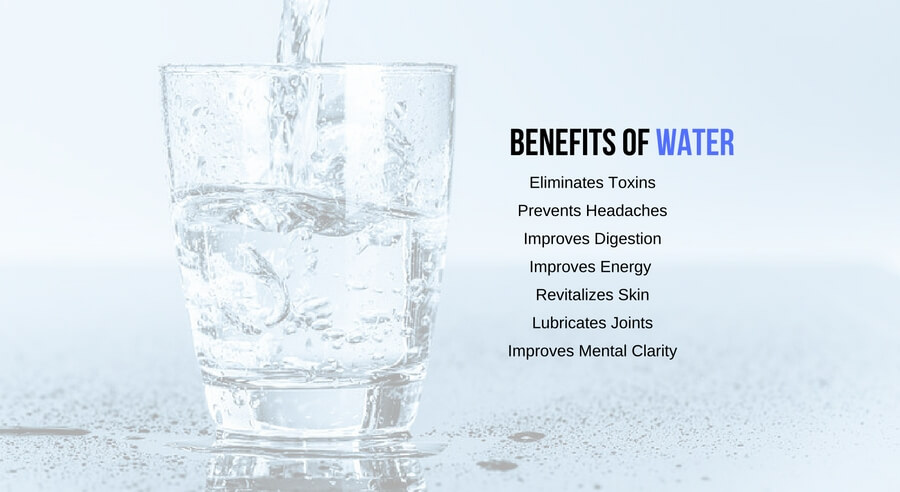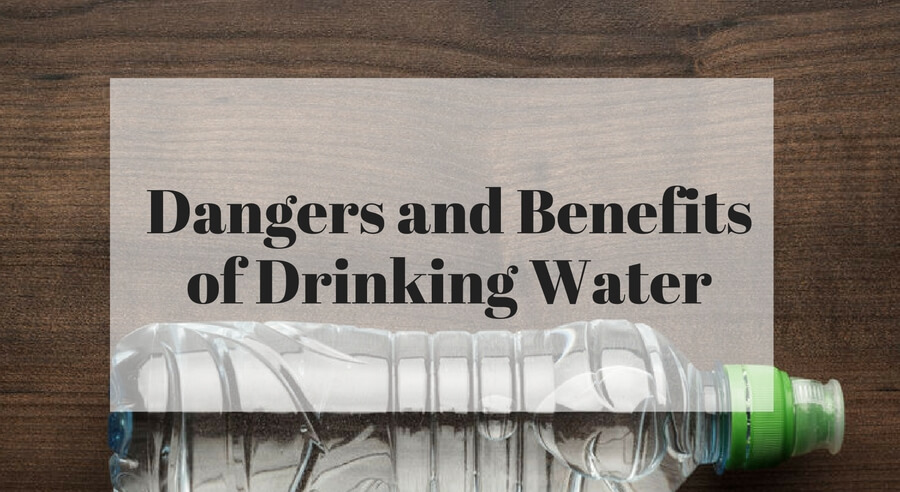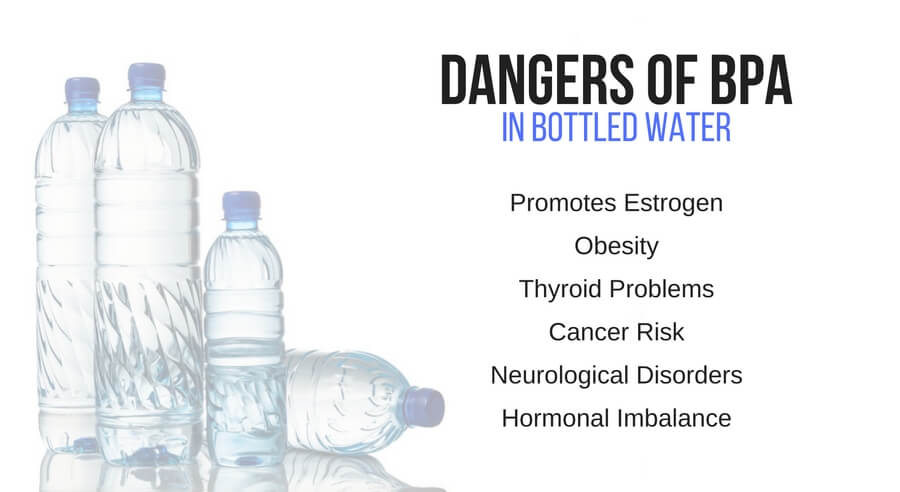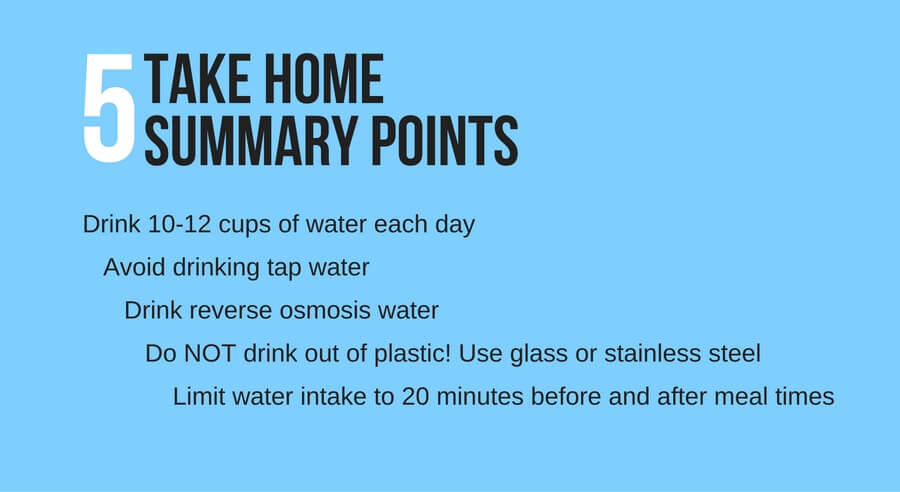Water has so many incredible benefits for the body, but only if it’s clean.
Unfortunately..
the water most of us have access to nowadays contains so many contaminants that it can be harmful for us.
So let’s take at one of the most beneficial liquids: water.
Why You Should Drink Water
65-75% of our body is made up of water.
The body’s water is responsible for and involved in nearly every body process including…
digestion, absorption, circulation, and excretion
Simply speaking:
Water transports nutrients throughout the body.
Replacing the water that is continually being lost through sweating and elimination is very important!

Most People Are Dehydrated!
People don’t drink enough water, and the fact that so many people drink coffee, tea, pop, and other forms of diuretics on a regular basis does not help.
In fact, about 75% of Americans are chronically dehydrated, which can lead to symptoms including headaches, fatigue, muscle and joint pain, and dry skin.
People often confuse their thirst signal with their hunger signal, which leads to overeating.
This is why it is important to drink water even when you do not feel thirsty.
Your urine will be pale yellow in color if the body is well hydrated.
Dangers of Tap Water
Most people assume that when they turn on their kitchen tap, they are getting clean, safe, healthy drinking water.
Unfortunately,
this is often not the case.
But there’s one problem:
tap water contains a number of different impurities and many harmful chemicals that can be harmful for the body.
Chlorine and Cancer
According to Health Canada, “chlorine is a disinfectant added to drinking water to eliminate microorganisms, such as bacteria and viruses”.
But studies show that the long term consumption of chlorinated water increases the risk of bladder cancer.
Believe it or not..
chlorine reacts with other chemicals in the water forming chlorinated-byproducts, which have been shown to increase the risk other forms of cancer.
Fluoride Declines IQ
Fluoride is added to the water to help develop and maintain strong bones and teeth.
But according to scientific review, fluoride is an endocrine disruptor (See: What is an endoctrine disruptor?) that can affect your bones, brain, thyroid gland, and pineal gland.
Fluoride can also be added to the list of chemicals that cause ‘brain drain’ (along with mercury and lead), as studies have shown that it reduces children’s IQ.
Dangers of Bottled Water
Bottled water companies use marketing techniques to convince us that their water is clean and healthy to drink.
However, studies have shown that 40% of bottled water is actually tap water that has not been filtered.
What makes bottled water even worse is that xenoestrogenic chemicals leach into the water from the bottle. Plastic bottles give off a synthetic compound called bisphenol A (BPA).
BPA is an endocrine disruptor, meaning it disrupts the body’s hormone balance.
Studies have shown that BPA increases aromatase activity, which promotes the rate at which testosterone is converted to estrogen. BPA has also been linked to obesity, thyroid problems and many other health concerns.
What’s even more surprising is that how many…
- personal trainers
- bodybuilders
- coaches
- athletes
you will see drinking out of plastic bottles given the large amount of research showing how bad it is.
The point?
One of best investments you will make in your health, is to get rid of all plastic bottles in your home and replace them with stainless steel bottles.
So What Do You Drink?
The solution is to install a high quality water filtration system for the house and to drink out of glass cups. Stainless steel carrying bottles are great for use outside of the house.
Reverse Osmosis Filters
Reverse osmosis filters are great systems as they effectively remove nearly all the major toxins out of the water, including chlorine and fluoride.
The downside is that they utilize a lot of water and they strip the minerals from water, but this is better than exposing your body to dangerous chemicals.
Plus, you can add the minerals back in by adding a small pinch of Himalayan salt to your water – contains the same 84 trace minerals and elements that are found in the human body.
Filtration systems can either be purchased or rented on a monthly basis.
There are many great options available for purchasing.
For rent, Culligan has many affordable monthly plans. Many reverse osmosis systems even add back the minerals that are stripped in the reverse osmosis process.
If you don’t want to get a filter, there are many companies that sell or deliver jugs of filtered water right to your house. You rent a water cooler for your house and fill it up with jugs. Do a Google search for ‘water delivery’ in your area and you will find many affordable options.
How Much Water Should I Drink?
The amount of water we need is based on a number of factors including our size, activity level, and our diet.
We recommend using the following as a rule of thumb to determine your water requirement:
½ bodyweight lbs = oz water
So a 200lb person requires 100 oz of water. 1 oz = 30mL, this equates to 3L of water.
If your bodyweight is significantly different from 200 lbs, we suggest you drink 10-12 cups each day.
Caffeinated beverages, such as:
coffee and tea, and alcohol do not count as they act as diuretics..
..causing the body to lose fluids.
Water is best consumed at several intervals throughout the day: 1 or 2 glasses upon waking and also about an hour before each meal.
Water with Meals Impairs Digestion
Avoid drinking water with meals as this dilutes stomach acid and negatively affects the digestion of food.
This is often why many people experience symptoms of bloating, acid reflux, and fatigue after eating.
It is important to limit water intake 20 minutes around mealtimes.




